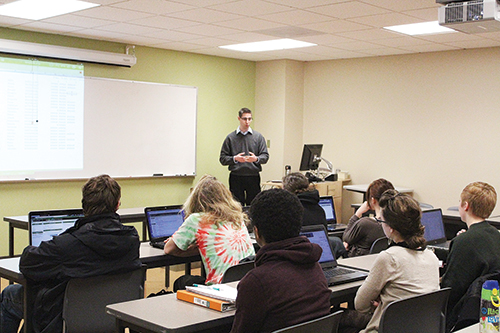Opportunity comes to the Portland State University Honors Program in the form of a $1 million gift. The gift, from the Rose E. Tucker Charitable Trust, is the third-largest donation to a scholarship endowment in the school’s history. The trust and the school have a long-running relationship, and this marks the trust’s largest donation to date.
Honors Program receives $1 million
 Igor Lacan, an assistant professor for the University Honors Program, lectures his “Global City” class. Photo by Corinna Scott.
Igor Lacan, an assistant professor for the University Honors Program, lectures his “Global City” class. Photo by Corinna Scott.
Opportunity comes to the Portland State University Honors Program in the form of a $1 million gift.
The gift, from the Rose E. Tucker Charitable Trust, is the third-largest donation to a scholarship endowment in the school’s history. The trust and the school have a long-running relationship, and this marks the trust’s largest donation to date.
The money will be used not only to help expand the program but also to provide greater opportunities for its students.
“Million-dollar gifts are few and far between, especially in Oregon,” PSU President Wim Wiewel said in a recent news release. “This is a big win for the University Honors Program in particular and for PSU and Portland in general. Our university attracts bright, talented students from around the world, and these students become productive, skilled members of our community.”
The future for the program is growth in both opportunity and size, and this grant is a step toward advancing the program into something greater.
“We’d really like to see it grow into an honors college,” said Ann Marie Fallon, director of the program. An honors college would create a higher profile for the program, help to attract more national recognition, and draw in more top students and funding, thus providing more for honors students.
More money means “nurturing local talent and keeping it here,” Fallon said. Roughly two-thirds of PSU graduates stay in the metropolitan area, and “an honors college can help keep graduates in the area and contribut[ing] to the community.”
The majority of the money will be used to help honors students like Nick Jenkins, a sophomore working toward a philosophy degree. Jenkins’ aspiration is to teach high school after completing college.
Jenkins relies on the program and the services it provides.
“It isn’t just for looking good on applications, it’s for opening doors,” he said.
The services the program offers are crucial in creating a supportive community where students can feel challenged and be pushed to their full potential, Jenkins explained. The surplus of funds will only open more doors and provide more opportunities for students like him, program organizers said.
Included in the gift is $500,000 in the form of a challenge grant. This challenges the university to match the amount with donated funds. When matched, the money will go toward scholarships and other aid for students. Donations are already coming in, and the program is on its way to meeting its goal. The remaining funds will be dispersed in equal installments over the next five years.
Roughly 75 percent of the money will be put toward student support. The contribution aids honors students through scholarships, and will also help fund internships, study-abroad programs and research programs, as well as help build a new urban ecology laboratory. Student recruitment is also a focus as the Honors Program looks to draw in students from the surrounding metropolitan area.
The creation of a new laboratory will greatly benefit the urban ecology program, said Igor Lacan, a professor of urban ecology. At the current lab, space and resources are limited, and teachers and students alike rely on sharing. It is a minimal lab, but, Lacan said, “it has worked well for short-term research.”
No longer will students be limited to conducting short-term projects. With the addition of space and resources, students of various fields of research can come together to work on long-term projects.
The lab will be a larger building, where students can work on projects and research. “There is so much interest among our students in research. It will be very well-used,” Lacan said.
Like the lab, the opportunities the money brings with it will aid the students of the Honors Program, which is ever-growing. The number of honors students has more than doubled since 2010, with enrollment jumping from 153 to 343 this year. With the recent gift, the number of honors students is expected to jump to 600 students within the next five years.







